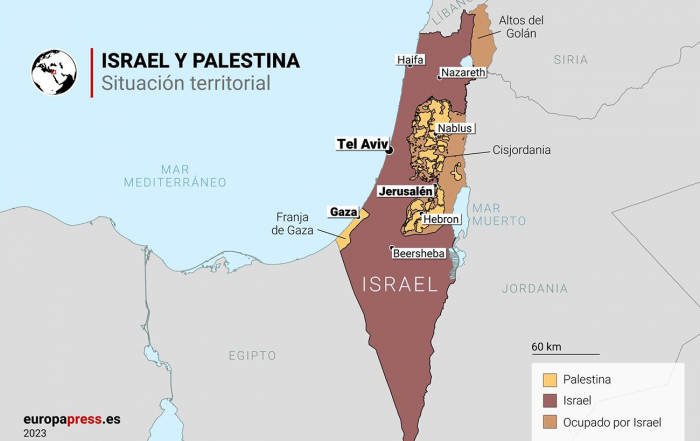By Abraham Shmulevich
When will Israel end its operations in the Gaza Strip?
Editor's note: Abraham Shmulevich, Israeli political scientist, president of the Eastern Partnership Institute.
The objectives of the Israeli ground offensive on Gaza, including its deadline and conditions,
have been repeatedly announced by Israel's top political and military leadership, including Prime Minister Benjamin Netanyahu. These objectives include the complete elimination of militants within the military faction of Hamas, the creation of conditions under which Hamas will never again be able to launch a serious attack on Israel, and the release of all hostages. These goals are supported by the vast majority of Israeli society, and any retreat from them will be perceived by the public as unacceptable.
Any ceasefire that allows Hamas to retain power in Gaza will be unacceptable. Everyone understands that even if Hamas retains civil authority, its military infrastructure will remain, and in a short time, or not so short, it will be able to restore its military strength. The use of modern technical means, such as drones, increasing the range and accuracy of missiles, etc., will lead to even greater threats, and an attack similar to the one that occurred on October 7 might be repeated.
Regarding the terms of the truce deal announced by President Biden, there are indeed many uncertainties. Firstly, it is unclear who exactly initiated this deal. Biden, for some reason, announced the deal and a plan for the Israeli government in Washington, while demanding that Israel present its own plan. On the other hand, these are not just rumors — the Knesset is officially pressuring Netanyahu's coalition deputies to accept the terms of this deal. Why the terms of this deal have not yet been disclosed is a question. According to Avigdor Lieberman, there is information that Netanyahu offered him the post of Defense Minister this Saturday. This is done so that if members of the ruling coalition oppose this deal, they can be replaced by Lieberman's party. Thus, some behind-the-scenes negotiations are taking place, and it is likely that the terms of this deal have not yet been fully agreed upon. We are talking about the Israeli and American sides, without mentioning Hamas. What is happening there is even more unclear.
However, in its current form, if this is indeed Israel's plan, and Biden is citing it, most commentators and probably Israeli society believe that if this is followed by a complete cessation of military actions, it will be unacceptable. The Israeli public is confident that even if some ceasefire agreement is reached for several months, Israel will be able to lead military operations to destroy the entire infrastructure of Hamas.
In fact, this situation has already occurred. There was a fairly long ceasefire, and then hostilities continued. Biden will likely demand a complete ceasefire from Israel after the trial period, during which most hostages will be released. Israel is unlikely to agree to this, as it would be political suicide for Netanyahu. Not only will his right-wing supporters be dissatisfied, but the opposition is already using it in its pre-election rhetoric - even though there are no elections yet, they are already being discussed. Thus, accusations of Netanyahu's inability to secure a victory over Hamas are being used in pre-election rhetoric. Lieberman is also talking about this, and almost all parties, except the ultra-left ones, are discussing it.
Therefore, it is difficult to imagine that Netanyahu will agree to a long-term ceasefire. This would be political suicide for him and indeed a disaster for Israel. I agree with this assessment. However, there are many unknowns and uncertainties surrounding this deal. Hamas's reaction is mostly unclear, and the public statements of Egypt do not clarify the situation either. Behind-the-scenes negotiations may be entirely different. It is known, for example, that Saudi Arabia begged Israel to launch an airstrike on Iran, offering its airspace and assistance, although this was not officially announced. Egypt officially supports a ceasefire, but the Egyptian regime is not interested in the existence of Hamas, as they are ideological enemies, so it is not known what the Egyptians are actually saying.
Another factor is the possibility of military operations resuming in the north of the country, where attacks by Hezbollah and Israel's retaliatory strikes continue. Hezbollah is considered a more serious enemy in Israel, with greater military capabilities than Hamas. Israel demanded that Hezbollah retreat beyond the Litani River to create a buffer zone, but Hezbollah refused. Today, the Chief of the General Staff made a significant statement after another powerful attack on the country in the north, which caused large forest fires. He expressed readiness to move from defense to offense. This may indicate that Israel is preparing for a military campaign in the north against Hezbollah.
However, I do not think this is possible with a ceasefire agreement between Israel and Hamas. In the event of early elections, demanded by the opposition, Netanyahu will likely lose, and the new government will not be able to sign a ceasefire agreement, allowing Hamas to recover. We will soon see what happens.
News.Az
https://news.az/news/when-will-israel-end-its-operations-in-the-gaza-strip-
